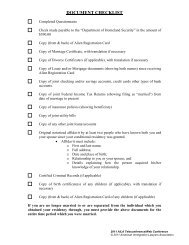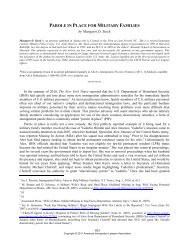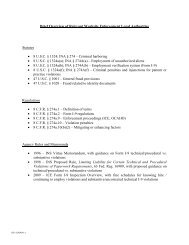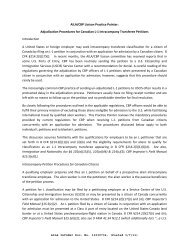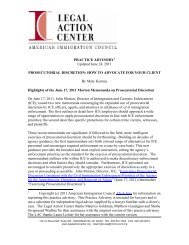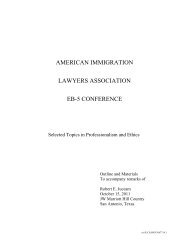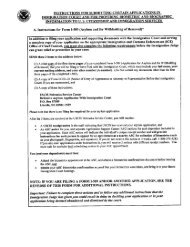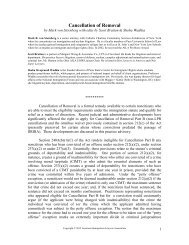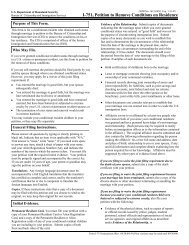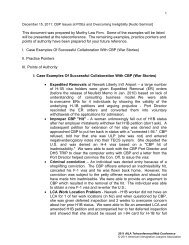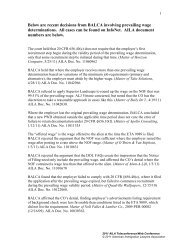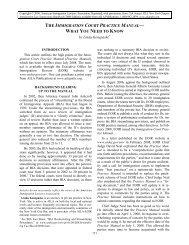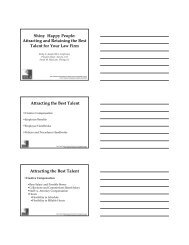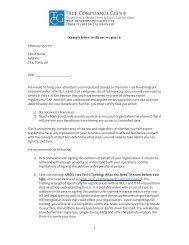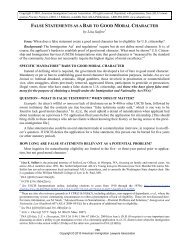Immigration Practice Pointers, 2010-11 Ed. - AILA webCLE
Immigration Practice Pointers, 2010-11 Ed. - AILA webCLE
Immigration Practice Pointers, 2010-11 Ed. - AILA webCLE
Create successful ePaper yourself
Turn your PDF publications into a flip-book with our unique Google optimized e-Paper software.
USCIS would recommend that petitioners who have very recently made significant changes<br />
ffecting their business operations (such as being acquired by a new company or moving to a new<br />
location) submit documentary evidence to explain the corporate change and substantiate the<br />
nature and identity of the new entity. Doing so may prevent the issuance of an RFE to clarify the<br />
petitioner’s validity. The goal for VIBE to eventually reduce the redundancy of RFEs related to<br />
the validity of a petitioner remains and USCIS continues to work to meet that goal. A recent<br />
technical enhancement to the VIBE system provides USCIS with a new capacity to relay<br />
information to adjudicators at all Service Centers about evidence received in response to an RFE.<br />
However, at this time, petitioners must respond directly to each RFE issued by USCIS --failure to<br />
respond directly to USCIS could result in denial.<br />
Question: I-539 – H-4 Cases<br />
When an I-539 is submitted for spouse and two siblings as derivative H-4s and one sibling ages out, the<br />
CIS will grant the child who ages out an H-4 status only until his 21 st birthday. If included in the I-539<br />
application is a second child who will not turn 21 years old, will the second child’s H-4 be granted only<br />
until the older child turns 21 years old? If so, are we required to file a separate I-539 for the younger<br />
child to avoid this scenario? Along those lines, will the spouse included with the I-539 also be granted<br />
only until the 21 st birthday of the oldest child? It seems that to limit all derivative beneficiaries on the<br />
same I-539 to the shortest time available to any one of the beneficiary unfairly reduces the options to the<br />
other beneficiaries or forces them to file two separate applications and pay two separate filing fees.<br />
Response: The practice at each service center, in accordance with regulations, is that extensions<br />
granted to family members on the same application be for the same period of time. The shortest<br />
validity period granted to any one member of the family would be the same for all on that<br />
application.<br />
Specifically, 8 CFR 214.1.(c)(2) states in part: Extensions granted to members of a family group<br />
must be for the same period of time. The shortest period granted to any member of the family<br />
shall be granted to all members of the family.<br />
Generally, when an H-4 nonimmigrant requests an extension of status, the validity period will be<br />
the same as that of the principal. However, if one of the applicants is a dependent child who will<br />
turn 21 before the principal alien’s stay expires, the validity period for that applicant and any coapplicants<br />
will extend until one day prior to the dependent child’s 21 st birthday.<br />
Question: H-1B Cap Exemption<br />
a) Petitioner’s Election on Cap Exemption<br />
We would like to reiterate our request that USCIS issue guidance to the field clarifying that petitioners<br />
may elect to file H-1B petitions as subject to the annual fiscal quota even if the petitioner has previously<br />
been approved as cap exempt or otherwise has a basis for claiming cap exemption. We understand that<br />
USCIS wishes to approve as many petitions as possible on a cap exempt basis in order to maximize the<br />
number of H-1Bs that remain available to cap subject petitioners. However, given the current uncertainty<br />
with regard to USCIS’ standard for adjudicating cap exemption cases - uncertainty that has not been<br />
resolved as a result of the April 28, 20<strong>11</strong> Interim Policy Memo, which did not articulate a new standard<br />
for cap exemption - many petitioners are forced to rely upon cap subject petitions in order to ensure any<br />
kind of predictability in planning for their workforce needs. There has been no APA notice and comment<br />
- 12 -<br />
<strong>AILA</strong> InfoNet Doc. No. <strong>11</strong>042964. (Posted 06/29/<strong>11</strong>)



